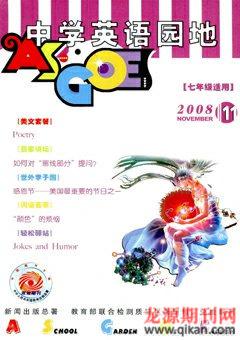新目标英语七年级(上)重、难点讲解(Units8~9)
胡扬朋
Unit 8When is your birthday?
1. —When is your birthday, Vera? 维拉,你的生日是哪一天?
—My birthday is October tenth. (P47) 我的生日是十月十日。
1) when与what time比较:
when和what time都可以表示“什么时候”,当询问做某事的具体时间时,两者可以互换。例如:
—What time/When do you usually get up? 你通常什么时候起床?
—At about six. 大约六点钟。
询问日期、月份或年份时,通常用when, 而不用what time。 例如:
—When were you born? 你是什么时候出生的?
—I was born on May 10, 1986. 我出生于1986年5月10日。
what time用于询问某个具体的时刻或钟点。例如:
—At what time do you go to school? 你几点钟去上学?
—I go to school at seven. 我七点钟去上学。
2) 英语中的日期表达法与汉语不一样,汉语的表达顺序是年、月、日,而英语的表达顺序通常是月、日、年。例如:
October 10th, 1988 1988年10月10日
表示日期时应用序数词,书写时定冠词the可以省略,序数词的词尾“th”也可以省略,但读时一定要读成序数词。例如: October 2/2nd 读作October the second。
2. —How old are you? 你多大了?
—Im fifteen. (P49) 我十五岁。
当你想知道某人的年龄时,可以用“How old + be + 主语?”进行询问,意为“某人多大年龄/几岁”,回答时常用“主语 + be + 基数词 + year(s)/months old”结构,也可以直接用一个基数词回答。例如:
—How old is your elder brother? 你哥哥多大了?
—Twenty. 二十岁了。
—How old is the baby? 这个婴儿多大了?
—He is five months old. 他五个月了。
“How old are you?”的同义句为“Whats your age?”, 其答语为“Its ...”。 例如:
—Whats your age? 你多大了?
—Its ten. 十岁。
注意:对于不熟悉的人,尤其是女性,最好不要直接问“How old are you?”, 否则会被视为不礼貌。如果你想知道对方的年龄,你可以说“Guess how old I am.”。 当对方猜出你的年龄之后,你可以说“What about you?”, 这样语气显得比较委婉。
3. Use your own name, age and date of birth. (P49) 使用你自己的姓名、年龄和生日信息。
名词age可以用来表示“年纪”、“岁数”。例如:
His two sons look the same age. 他的两个儿子看上去年龄一样大。
She is forty years of age. 她今年四十岁。
注意: 1) 用age作主语表示“某人的年龄是几岁”时,表语只能用数词,后面不能再加years old。 试译:他的年龄是二十岁。
误: His age is twenty years old.
正: His age is twenty.
2) 用young/old作表语表示“某人年纪轻/年纪大”时,不能用age作主语。试译:他母亲的年纪很大。
误: His mothers age is very old.
正: His mother is very old.
4. —Do you have a School Day at your school? 你们学校有校庆日吗?
—Yes, we do. (P51) 是的,有。
1) School Day意为“校庆日”, school day则意为“学校上课日”。
2) day与date比较:
day表示“白天”、“一日”,可指长达24小时的一整天,与night相对。例如:
He works eight hours a day. 他一天工作八个小时。
We are very busy these days. 这些天我们很忙。
day也含有“节日”、“假日”、“生日”的意思。例如:
New Years Day is the 1st of January. 元旦是一月一日。
day有时也指天气情况。例如:
Its a fine day today. 今天天气晴朗。
date指具体的日期。例如:
The date of her birth is June 13, 1977. 她出生于1977年6月13日。
You forgot the date! 你忘了日期!
注意: day与date在下面的句子中的意思是不一样的。试比较:
—Whats the date today? 今天几号?
—Its May 3rd. 今天是5月3日。
—What day is today? 今天是星期几?
—Today is Sunday. 今天是星期日。
5. Are you having a fun birthday? (P52) 你生日过得开心吗?
have a fun birthday意为“生日过得开心”, fun在句中作形容词用,意为“有乐趣的”。例如:
For most students, the weekend was fun. 对大部分学生来说,周末是愉快的。
[练一练]
1. 用when或what time填空。
1) — _______does your mother go to work?
—She goes to work at 8:00.
2) —________do you play basketball?
—I play basketball in the afternoon.
3) —At________do you usually have breakfast?
—I usually have breakfast at seven.
4) —__________is it now?
—Its eight oclock.
2. 用day或date填空。
1) —Are you busy these __________?
—Yes, we are.
2) —Do you know what_________it is today?
—Its Saturday.
3) —What is the__________today?
—Its November 2.
4) Please put the__________on the upper right of the letter.
Key:
1. 1) When/What time2) When3) what time4) What time
2. 1) days2) day3) date4) date
Unit 9Do you want to go to a movie?
1. Do you want to go to a movie? (P53) 你想去看电影吗?
1) want是及物动词,后跟名词或代词作宾语,意为“想要某物”。例如:
The boy wants an apple. 那个男孩想要一个苹果。
I want a new bicycle for my birthday. 我过生日的时候想要一辆新自行车。
want后面也可接动词不定式作宾语,意为“想要做某事”。例如:
I want to go to Europe. 我想去欧洲。
My sister wants to learn English, too. 我妹妹也想学英语。
want也可用于“want somebody to do something”结构,意为“想要某人去做某事”。例如:
I want you to help me. 我想让你帮个忙。
My classmates want me to work for the wall-newspaper. 我们班的同学想让我负责墙报工作。
2) go to a movie意为“去看电影”。此意也可用go to movies/go to see a film/go to the cinema等表示。例如:
I often go to the cinema on Sundays. 我星期天常去看电影。
Lets go to see a movie. 我们去看电影吧。
2. What kind of movies do you like? (P54) 你喜欢看什么样的电影?
What kind of意为“什么样的”、“哪一种”。例如:
What kind of man is he? 他是哪种类型的人?
What kind of book do you like? 你喜欢哪一类书?
注意: what kind of之后一般不用冠词。 kind是名词,意为“种类”, a kind of意为“一种”, all kinds of意为“各种各样的”, many kinds of意为“许多种的”等。例如:
This is a kind of new bike. 这是一种新自行车。
He has all kinds of stamps. 他有各种各样的邮票。
3. Find classmates who like the kinds of movies on the chart below. (P55) 找出喜欢看下表中那些类型的电影的同学。
1) find与look for比较:
find和look for都有“找”的意思。 look for意为“寻找”,强调“找”的动作和过程。例如:
He is looking for different places. 他在寻找不同的地点。
Are you still looking for your bike? 你还在找你的自行车吗?
find意为“找到”,强调“找”的结果。例如:
I cant find the broom. 我找不到扫帚。
I hope youll soon find your lost ring. 我希望你早点找到你丢失的戒指。
2) someone与some one比较:
someone(= somebody)意为“某人”、“有人”, 不能与of短语连用。 someone用作主语时,谓语动词应为单数形式。例如:
Someone wants to see you. 有人想见你。
Someone says so. 有人这样说。
some one意为“某一个人/物”,可以与of短语连用。例如:
Some one of my friends will come to see me. 我有位朋友要来看我。
Some one of these books is very interesting. 这些书中有一本非常有趣。
4. June really likes action movies, and she often goes to see Chinese action movies. (P56) 琼确实喜欢动作片,而且她经常去看中国的动作片。
really用作副词,意为“真正地”、“无疑地”,常用来修饰动词、形容词或其他副词。例如:
Do you really love him? 你真地爱他吗?
Im really hungry. 我真是饿了。
really还可以用来表示惊讶,甚至难以置信,意为“真的吗?”、“是这样的吗?”。例如:
—Im going to the United States next month. 我下个月要去美国。
—Really? 真的吗?
5. She thinks they are very exciting. (P56) 她认为它们非常令人兴奋。
动词think意为“认为”,后面可以跟that引导的宾语从句, that通常可以省略。例如:
I think (that) he is right. 我认为他是对的。
She thinks (that) she is old. 她认为她老了。
注意: think后面接含有否定意义的宾语从句时,常将该宾语从句中的not转移到think前面,这叫做否定的转移。试译:我认为吉姆不会游泳。
误: I think Jim cant swim.
正: I dont think Jim can swim.
6. She thinks she can learn about Chinese history. (P56) 她认为她可以了解中国历史。
1) 动词词组learn about (= learn of) 意为“听说”、“了解到”,强调间接地获得信息或了解到某种情况。例如:
We learned about him from his words. 我们从他的言谈话语中了解到他的情况。
I am sorry to learn of his illness. 听说他生病,我感到很难过。
2) Chinese意为“中国的”、“中国人的”,作形容词用。例如:
Many Americans like Chinese food. 许多美国人喜欢中国食品。
The Chinese people love peace. 中国人民热爱和平。
Chinese也可以作名词用,意为“中国人”。“一个中国人”是a Chinese, “许多中国人”是many Chinese。 Chinese的单、复数形式是一样的。例如:
We are Chinese. 我们是中国人。
The Chinese are hard-working and kind. 中国人民勤劳、善良。
Chinese也可以作“汉语”解。例如:
Mary can sing in Chinese. 玛丽能用汉语唱歌。
7. He often goes to see Beijing Opera on weekends. (P57) 周末他常去看京戏。
1) often意为“常常”、“经常”,是频度副词,一般位于行为动词之前,情态动词、助动词和be动词之后。例如:
He is often late for school. 他经常上学迟到。
I often go to the park with my mother on Sundays. 星期天我经常和妈妈一起去公园。
It rains very often here in July. 这里七月份经常下雨。
8. Mike is English, but he likes Beijing Opera! (P57) 迈克是英国人,可他喜欢京戏。
1) “他是英国人”可以说成“He is English.”, 不能说“He is an English.”, 但可以说“He is an Englishman.”。 the English是“英国人”的总称,用作主语时,谓语动词要用复数形式。例如:
The English speak English. 英国人说英语。
2) but是并列连词,意为“但是”、“然而”,它连接的词、短语和句子之间有对立或对照的关系。例如:
I have two sisters but no brothers. 我有两个姐姐,但没有兄弟。
She is an American, but she lives in England. 她是美国人,但居住在英国。
Its not cheap, but its very good. 这东西不便宜,但质量很好。
[练一练] 用find或look for填空:
1) Hello, Tom! Someone _________you.
2) Can you _________these places?
3) I _________my brother. Do you know where he is?
4) He_______his pen, but he cant_______it.
Key: 1) is looking for2) find3) am looking for
4) is looking for; find

